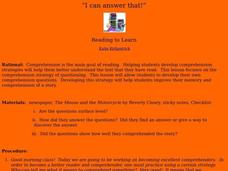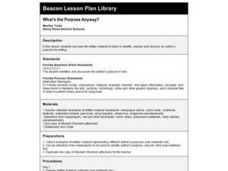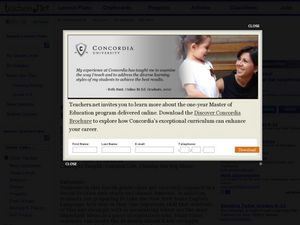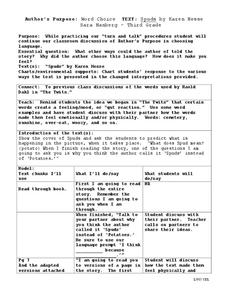Curated OER
Reading Skills: Chunking
Prepare advanced English learners and low-level readers for the reading demands of post-secondary education with skill of chunking. Readers learn to make meaning from phrases rather than individual words, helping them to read more...
Curated OER
Author's Purpose
A simple activity for young readers, this introduces the idea of author purpose. Learners analyze various types of texts (newspaper articles, magazines, books, advertisements, etc.) and determine if the author's purpose for writing was...
Curated OER
Summarization Superstars
How do you read when you know you're going to be summarizing a text? Summarize a nonfiction text with your upper elementary schoolers. Your pupils independently read a nonfiction article and write a summary paragraph using the six-step...
Curated OER
Teaching Summarization
Examine the process of summarizing a piece of text using the book So You Want to Be a President? Kids review the definitions for main idea, topic sentences, superordinate terms, and supporting details. Next, they work in small groups to...
Curated OER
Question What You Read
Readers test their reading comprehension after reading a nonfiction text about Paleo Indians. (This text is in Alabama: It's History and Geography, but other texts can be used.) After reading the nonfiction article as a class, they...
Curated OER
Summarizing: James and the Giant Peach
Text marking and a T-chart format to distinguish important information from trivia help elementary readers summarize effectively. Encouraging readers to construct a chapter summary from paragraph-level topic sentences is another sound...
Curated OER
Writing Process-- Revision and Editing
As guided practice, class members work together to revise a model persuasive paragraph. Then they practice independently with their own writing. The included rubric looks at prewriting, drafting, revising, editing, nonfiction text...
Curated OER
Compare and Chart the Stories
Elementary schoolers engage in a literature study. They make comparisons of two different versions of a story using a graphic organizer. Using the text and pictures elementary schoolers investigate three elements from the story. Then,...
Curated OER
The 5 W's
Examine how to answer who, what, when, where, and why when reading text. Young writers listen to the story Skeleton Hiccups, and as a class answer and discuss the five W's. Independently they read the story silently, and write the...
Curated OER
Shorten the Length
Learn how to summarize by identifying main ideas and supporting details. Readers cross out unimportant information as they read through a text. Is it a random detail? Cross it out! They then draw a concept map, placing the main idea in...
Curated OER
I Can Answer That!
Enhance reader comprehension! Examine different comprehension strategies with your second, third, and fourth graders. They discuss the strategy of questioning by developing their own comprehension questions to help improve their memory...
Curated OER
Writing a Summary
Skim, reread, and then take notes. The step-by-step procedure outlined in this resource can be used to help pupils write a summary of a reading passage. Using their notes, class members then draft a summary focusing on the main idea and...
Curated OER
Learning From World War II and Connecting It to the Present
Compare and contrast World War II to the modern Iraq war with this instructional activity. After watching a film, learners use supporting evidence to support their point of view of the conflicts. Using the internet, they create a...
Curated OER
Short and Sweet
Students examine how to summarize information from expository text. They read an expository text and identify the important information from the reading. Students identify the topic sentence and write their own topic sentences.
Curated OER
What's the Purpose Anyway?
Examine author's purpose in newspaper articles, comic books, cookbooks, encyclopedias and other forms of written materials. Working in groups, middle and high schoolers read teacher-selected articles and write an explanation of the...
Curated OER
Analyzing Verb Use: Part 2
With the Wordle ap in one hand, and their favorite writing piece in the other, 3rd graders analyze their verb usage. They select a piece they have written, type it into Wordle, then analyze their word choices and alter them using synonyms.
Curated OER
Museum Text Messaging
Young scholars pretend they are in a museum and are to explain a painting to a friend using text messaging. They identify the correct painting based on the message. They answer questions to complete the instructional activity.
Curated OER
Identifying Important Ideas in Expository Text
Students identify the main ideas from expository text. In this main ideas lesson, students read a piece of text and practice identifying what is most important. Students complete another sample reading with a group then discuss as a class.
Curated OER
Making Real-Life Connections and Introducing Expository Text
Third graders write directions. In this real-life connections instructional activity, 3rd graders write the steps for making a peanut butter and jelly sandwich. After writing, students share their papers and actually make the sandwiches...
Curated OER
Scanning Text
Students search for particular piece of information in text. They develop skills of looking for information and finding specific data without reading the whole text.
Pennsylvania Department of Education
Comparing Key Ideas and Details in Fiction and Nonfiction
Students recognize the differences between fiction and nonfiction texts. In this genre study lesson, students discuss what nonfiction means and write the definition. Students listen to a read aloud and vote whether the text is fiction or...
Curated OER
To Sum it all Up...
Students observe and demonstrate the process of summarizing text. They read and discuss the steps to summarize text, then in small groups read and summarize an article about frogs from "National Geographic" online. Independently they...
Curated OER
Word Purpose
Third graders chunk text while reading it. In this language arts instructional activity, 3rd graders determine the author's purpose for calling certain things the names they are called like spuds for potatoes. Students discuss how words...
Curated OER
Some Simple Rules to Sum it Up!
Students observe and demonstrate three steps to summarize text. They read and discuss the three steps to summarizing, then silently read an article about dugongs from "National Geographic Kids" magazine. Students demonstrate the three...
Other popular searches
- Procedural Text Activities
- Procedural Text Examples
- Procedural Text Reading
- Procedural Text Grade 3
- Procedural Text Writing
- Procedural Text Lesson
- Lesson Plan Procedural Text
- Procedural Text Assessment
- Procedural Text Recipes
- Lesson Procedural Texts
- Easy Procedural Texts
- Procedural Text Kindegarten

























